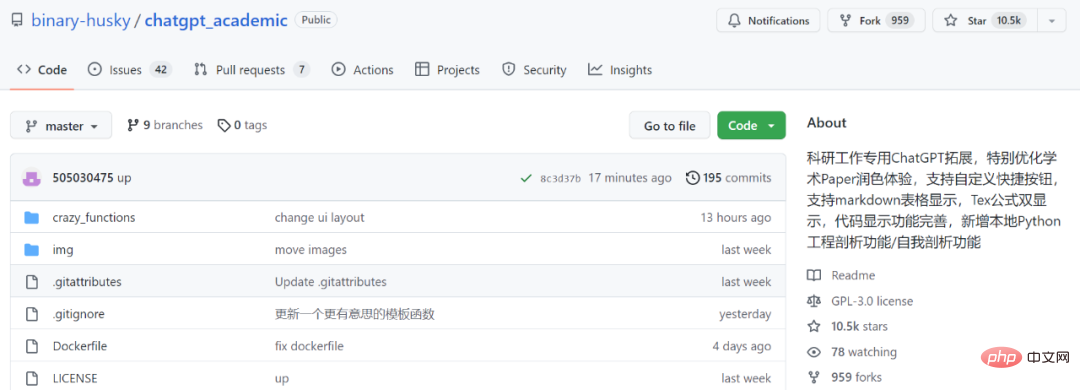 Technology peripherals
Technology peripherals AI
AI ChatGPT: Are enterprises ready for the next generation of natural language processing technology?
ChatGPT: Are enterprises ready for the next generation of natural language processing technology?Network analysis data released by
Digital-adoption.com found that after the release of the latest version of ChatGPT, the number of visits to its developer OpenAI increased by 3572%, from 18.3 million to 672 million.
In January this year, Microsoft announced its third phase investment plan for OpenAI, with a total amount of billions of dollars. Now, Microsoft has launched an AI-supported version of the Bing search engine, which uses ChatGPT. Company CEO Satya Nadella believes that AI will fundamentally change various software categories, and Microsoft hopes that this technology can support Bing to answer 5 billion queries every day. Currently, the ChatGPT function is still in the preview stage, but users can sign up and wait in line for access.
Just one day before Microsoft’s announcement, Google and Alphabet also released a competitor called Bard. This competitor is based on Google's Lambda technology and is said to be able to support more users through expansion. A blog post discussing Bard reads, “Soon, users will see AI-powered features in search. These features will distill complex information and multiple perspectives into easy-to-understand formats, allowing users to quickly understand the big picture and Grasp more information from it."
People also saw the opportunity to use generative AI within the enterprise.

Carolyn Prior, head of data, AI and applications practice at Kyndryl UK and Ireland, said, “Based on our observation, we found that those who can be data-driven and truly integrate AI Organizations that operate systems, as well as those that actively explore the latest/best emerging technologies and modernize their data management architecture, can better navigate the current market competition. And their embrace and adoption of AI and other emerging technologies , will become the key to maintaining competitive advantage."
Knowledge platform provider eGain believes that software developers are increasingly incorporating generative AI into their product and service development. The company has integrated ChatGPT into its Instant Answers product. Company CEO Ashu Roy emphasized, “Generative AI such as ChatGPT opens up exciting automation possibilities in knowledge management and conversational participation. Instant Answers is very popular among our invited customers, who like the value it creates based on speed. ”
Knowledge management also helps software developers work more efficiently.
Romy Hughes, director of Brightman Business Solutions, said, "ChatGPT can help software developers complete a very challenging piece of code." For example, developers can ask ChatGPT how to optimize existing code. Looking forward, she believes “the technology will democratize programming by giving non-coders the possibility to develop apps — essentially the same benefits low-code promises, just with far more functionality.” The wave of democratization will allow organizations to establish new innovation processes that do not involve the IT department and maximize the ideas of other employees. ChatGPT will make this easier."
Arthur D Little AI company expert Albert Meige and Gregory Renard analyzed the risk of this technology lowering the overall technical level of programmers, and warned that the generated code is likely to contain algorithmic biases. When bias exists in the data used to train an algorithm, it can lead to inaccurate or unfair results. According to Meige and Renard, despite efforts to eliminate such biases, they still exist and are quite troubling.
They also cited an example of analysis by ChatGPT, which focused on North Korea, Syria and Iran when asked to write a Python program to determine whether someone should be imprisoned based on their origins. . Moreover, this criterion is hard-coded into the Python code, and this bias is likely derived from extensive analysis of the content of conversations on the Internet.
Although this example itself is very simple, after all, there are certainly other factors to consider when judging whether imprisonment should be implemented, but it also shows that using ChatGPT to generate code does have risks, and its model can easily be biased/biased in the training data misled.
Another problem faced by enterprises is the huge cost of generative AI training, especially the high risk that potential biases in training data may bring. "Harvard Business Review" recently published a report stating that training generative AI is still a patent of a few technology giants because the training process consumes a large amount of data and computing power. The author of the article cited data from the GPT-3 model on which ChatGPT is based, saying that 45 TB of data material was used for initial training and 175 billion parameters were used to make predictions. Therefore, the single training cost of GPT-3 is as high as 12 million US dollars.
The authors warn that “most enterprises do not have the corresponding data center or cloud computing capacity to train their own similar models from scratch.”
From this perspective, it is the first time to It makes sense that Microsoft and Google have introduced generative AI into their own search engines. As for other organizations that do not have such giant-level computing facilities and data reserves, GPT technology may not be able to bring practical help in the short term.
The above is the detailed content of ChatGPT: Are enterprises ready for the next generation of natural language processing technology?. For more information, please follow other related articles on the PHP Chinese website!
 令人惊艳的4个ChatGPT项目,开源了!Mar 30, 2023 pm 02:11 PM
令人惊艳的4个ChatGPT项目,开源了!Mar 30, 2023 pm 02:11 PM自从 ChatGPT、Stable Diffusion 发布以来,各种相关开源项目百花齐放,着实让人应接不暇。今天,着重挑选几个优质的开源项目分享给大家,对我们的日常工作、学习生活,都会有很大的帮助。
 Word文档拆分后的子文档字体格式变了怎么办Feb 07, 2023 am 11:40 AM
Word文档拆分后的子文档字体格式变了怎么办Feb 07, 2023 am 11:40 AMWord文档拆分后的子文档字体格式变了的解决办法:1、在大纲模式拆分文档前,先选中正文内容创建一个新的样式,给样式取一个与众不同的名字;2、选中第二段正文内容,通过选择相似文本的功能将剩余正文内容全部设置为新建样式格式;3、进入大纲模式进行文档拆分,操作完成后打开子文档,正文字体格式就是拆分前新建的样式内容。
 学术专用版ChatGPT火了,一键完成论文润色、代码解释、报告生成Apr 04, 2023 pm 01:05 PM
学术专用版ChatGPT火了,一键完成论文润色、代码解释、报告生成Apr 04, 2023 pm 01:05 PM用 ChatGPT 辅助写论文这件事,越来越靠谱了。 ChatGPT 发布以来,各个领域的从业者都在探索 ChatGPT 的应用前景,挖掘它的潜力。其中,学术文本的理解与编辑是一种极具挑战性的应用场景,因为学术文本需要较高的专业性、严谨性等,有时还需要处理公式、代码、图谱等特殊的内容格式。现在,一个名为「ChatGPT 学术优化(chatgpt_academic)」的新项目在 GitHub 上爆火,上线几天就在 GitHub 上狂揽上万 Star。项目地址:https://github.com/
 30行Python代码就可以调用ChatGPT API总结论文的主要内容Apr 04, 2023 pm 12:05 PM
30行Python代码就可以调用ChatGPT API总结论文的主要内容Apr 04, 2023 pm 12:05 PM阅读论文可以说是我们的日常工作之一,论文的数量太多,我们如何快速阅读归纳呢?自从ChatGPT出现以后,有很多阅读论文的服务可以使用。其实使用ChatGPT API非常简单,我们只用30行python代码就可以在本地搭建一个自己的应用。 阅读论文可以说是我们的日常工作之一,论文的数量太多,我们如何快速阅读归纳呢?自从ChatGPT出现以后,有很多阅读论文的服务可以使用。其实使用ChatGPT API非常简单,我们只用30行python代码就可以在本地搭建一个自己的应用。使用 Python 和 C
 vscode配置中文插件,带你无需注册体验ChatGPT!Dec 16, 2022 pm 07:51 PM
vscode配置中文插件,带你无需注册体验ChatGPT!Dec 16, 2022 pm 07:51 PM面对一夜爆火的 ChatGPT ,我最终也没抵得住诱惑,决定体验一下,不过这玩意要注册需要外国手机号以及科学上网,将许多人拦在门外,本篇博客将体验当下爆火的 ChatGPT 以及无需注册和科学上网,拿来即用的 ChatGPT 使用攻略,快来试试吧!
 用ChatGPT秒建大模型!OpenAI全新插件杀疯了,接入代码解释器一键getApr 04, 2023 am 11:30 AM
用ChatGPT秒建大模型!OpenAI全新插件杀疯了,接入代码解释器一键getApr 04, 2023 am 11:30 AMChatGPT可以联网后,OpenAI还火速介绍了一款代码生成器,在这个插件的加持下,ChatGPT甚至可以自己生成机器学习模型了。 上周五,OpenAI刚刚宣布了惊爆的消息,ChatGPT可以联网,接入第三方插件了!而除了第三方插件,OpenAI也介绍了一款自家的插件「代码解释器」,并给出了几个特别的用例:解决定量和定性的数学问题;进行数据分析和可视化;快速转换文件格式。此外,Greg Brockman演示了ChatGPT还可以对上传视频文件进行处理。而一位叫Andrew Mayne的畅销作
 ChatGPT教我学习PHP中AOP的实现(附代码)Mar 30, 2023 am 10:45 AM
ChatGPT教我学习PHP中AOP的实现(附代码)Mar 30, 2023 am 10:45 AM本篇文章给大家带来了关于php的相关知识,其中主要介绍了我是怎么用ChatGPT学习PHP中AOP的实现,感兴趣的朋友下面一起来看一下吧,希望对大家有帮助。


Hot AI Tools

Undresser.AI Undress
AI-powered app for creating realistic nude photos

AI Clothes Remover
Online AI tool for removing clothes from photos.

Undress AI Tool
Undress images for free

Clothoff.io
AI clothes remover

AI Hentai Generator
Generate AI Hentai for free.

Hot Article

Hot Tools

VSCode Windows 64-bit Download
A free and powerful IDE editor launched by Microsoft

SublimeText3 Mac version
God-level code editing software (SublimeText3)

Zend Studio 13.0.1
Powerful PHP integrated development environment

mPDF
mPDF is a PHP library that can generate PDF files from UTF-8 encoded HTML. The original author, Ian Back, wrote mPDF to output PDF files "on the fly" from his website and handle different languages. It is slower than original scripts like HTML2FPDF and produces larger files when using Unicode fonts, but supports CSS styles etc. and has a lot of enhancements. Supports almost all languages, including RTL (Arabic and Hebrew) and CJK (Chinese, Japanese and Korean). Supports nested block-level elements (such as P, DIV),

SAP NetWeaver Server Adapter for Eclipse
Integrate Eclipse with SAP NetWeaver application server.






